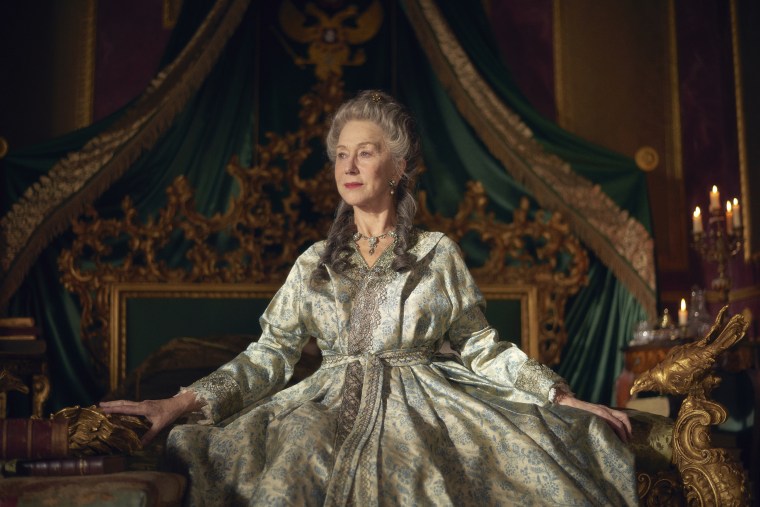Earlier this year, HBO and Sky TV found massive and somewhat unexpected success with the miniseries “Chernobyl.” The Monday night deep dive into 1980s Russian history even beat “Game of Thrones” in digital viewership. Six months later, HBO and Sky are trying to recreate the same success with a different Russian themed miniseries, “Catherine the Great.” Also airing in the Monday night spot, this series, featuring Helen Mirren as the titular empress, is impressively detailed in costume and setting, albeit a little fuzzy in its history. Despite this, the results are riveting. Mirren is exceptional in a story that humanizes Russia's greatest leader in a way rarely afforded to women.
Mirren is exceptional in a story that humanizes Russia's greatest leader in a way rarely afforded to women.
HBO’s “Catherine the Great” isn’t the first TV series to focus on humanizing female rulers, of course. PBS has “Victoria,” the third season of which aired last winter. Netflix has “The Crown,” about Victoria’s great-great-granddaughter, Elizabeth II. But both those queens are beloved figures relatively well known in the West. And both used their gender to soften their image, even as they found ways to hold on to power within a patriarchy.
Victoria, for instance, found it so necessary to project the image of domestic bliss that she claimed her son Edward was unfit for the throne because of his playboy dalliances and scandal-ridden behavior. The first two seasons of “The Crown” have returned time and again to the idea that Elizabeth and Philip would be far happier in their marriage if only she didn’t outrank him in status. And neither Victoria nor Elizabeth II were born to power, instead finding themselves next in line via accidents of history.
“Catherine the Great” feels no such need to soften its monarch. For one thing, the woman born Princess Sophie of Anhalt-Zerbst of the ruling German family of Anhalt did not become empress by accident. After her family married her into the Russian royal family, she waited 15 or so years for her husband, Peter III, to ascend the throne. Then she politely waited a whole six months before staging a coup with her lover, Grigory Orlov, where her husband was murdered and took power for herself.
Nor was Catherine a woman interested in projecting an ideal of domestic tranquility to keep herself beloved by her people. Like Elizabeth I, she never married, understanding intrinsically that her husband would attempt to take power. But she was no virgin queen either, swapping out lovers continuously.
Nor was Catherine a woman interested in projecting an ideal of domestic tranquility to keep herself beloved by her people. Like Elizabeth I, she never married.
The series starts the story well into Catherine’s reign. Her son, Paul (Joseph Quinn), has come of age, but to the horror of those who assumed her to be some kind of temporary monarch, Catherine has no interest in ceding the throne. Moreover, Orlov (Richard Roxburgh) has also realized that marriage is not forthcoming. More important, he suspects that Catherine is bored of him and ready to trade him for Grigory Potemkin (Jason Clarke). Meanwhile, not far away, a group of would-be rebels are planning their own coup, claiming that the long imprisoned and slightly mad Ivan VI is the rightful heir.
None of those things happened at the same time, mind you. Like both “Victoria” and “The Crown,” the show muddles history together. Catherine is beset on all sides by those who would pull down this uppity female usurper. And yet she stamps it out at every turn, treating those who would take her down as mostly trifling, irritating trolls.
But HBO’s series is not just a look at a woman who took power and then held on to it without playing to the patriarchy. Catherine is a historical figure whose achievements, according to historians like Walter G. Moss, have been downplayed by the 19th century men who wrote the histories that followed her. A rumor about her death and a horse has become one of the most memorable things about her legacy, which only speaks to how deeply men needed to bury her reputation.
HBO elevates Catherine back to her rightful place in Russian history. She decided that Russia should be dragged into the modern age, kicking and screaming if need be. (The opening episode shows her giving a speech decrying the current serf system as slavery.) The series goes on to highlight some of her conquests, including the parts of southeastern Europe that have become extremely topical in the wake of the U.S. military withdrawal from the Turkish border. Though the show never explicitly draws the parallels, it’s hard not to notice that Catherine’s conquests and Russia’s current sphere of influence loudly overlap. All of Russia’s modern power grabs owe a lot to the groundwork she laid over 250 years ago.
But Catherine is not simply a geopolitical mastermind. She may shut down any coup involving the use of her son, but that doesn’t mean she doesn’t love him in her own fashion. Potemkin may be one of her greatest generals, winning on the battlefield, but her lust for him (and eventual feelings) have a lot to do with the fact that he’s a man who actually gets her.
And then there’s the actress behind it all. The show is a Helen Mirren tour de force. Some actresses seem to be born to play queens, and Mirren is one of them. Her characterization of Catherine is somehow, remarkably, better than any that have come before. She inhabits the monarch with a level of nuance that would carry the series even if it were terrible.
Mirren’s role as Queen Elizabeth in “The Queen” is partly why “The Crown” is a TV show in the first place, and why ITV made “Victoria” in response. If “Catherine the Great” and “Chernobyl” go on to spawn another cottage industry of Russian history-based miniseries, the world would be a better place for it.



